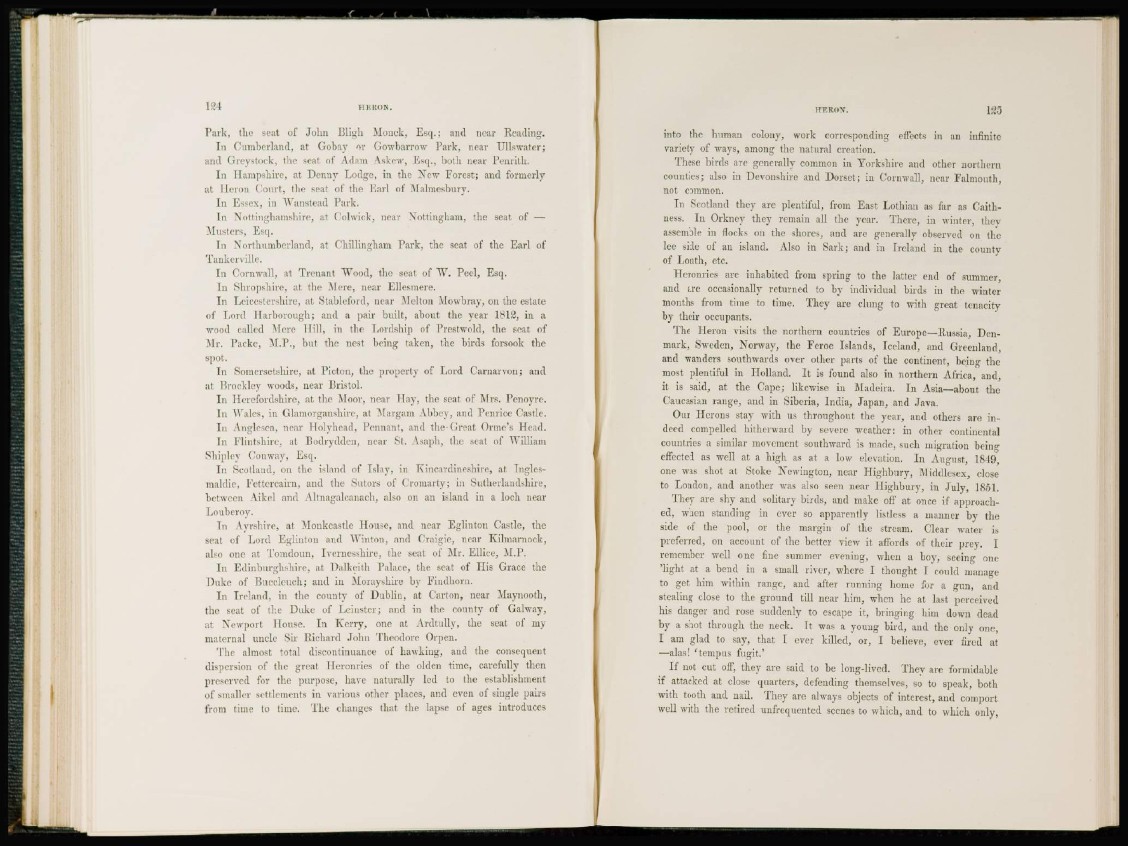
m HERON.
Park, the scat of John Bligh Mo nek, Esq.; and near Reading.
I n Cumberland, at Gobay or Gowbarrow Park, near TJlIswater;
and Greystock, the seat of Adam Askew, Esq., both near Penrith.
In Hampshire, at Denny Lodge, in the New Forest; and formerly
at Heron Court, the seat of the Earl of Malmesbury.
I n Essex, in Wanstead Park.
I n Nottinghamshire, at Colwick, near Nottingham, the seat of —
Musters, Esq.
I n Northumberland, at Chillingham Park, the seat of the Earl of
Tankerville.
I n Cornwall, at Trenant Wood, the seat of W. Peel, Esq.
In Shropshire, at the Mere, near Ellesmere.
In Leicestershire, at Stableford, near Melton Mowbray, on the estate
of Lord Harborough; and a pair built, about the year 1812, in a
wood called Mere 1 [ill, in the Lordship of Prestwold, the seat, of
Mr. Packc, M.P., but the nest being taken, the birds forsook the
spot.
I n Somersetshire, at Picton, the property of Lord Carnarvon; and
at Brockley woods, near Bristol.
In Herefordshire, at the Moor, near Hay, the seat of Mrs. Penoyre.
In Wales, in Glamorganshire, at Margam Abbey, and Pcnrice Castle.
I n Anglesea, near Holyhead, Pennant, and the-Great Ormc's Head.
I n Flintshire, at Bodrydden, near St. Asaph, the scat of William
Shipley Conway, Esq.
I n Scotland, on the island of Islay, in Kincardineshire, at Tnglesmaldie,
Fettercairn, and the Sutors of ('rouiarty; in Sutherlandshire,
between Aikel and Altnagalcanach, also on an island in a loch near
Louberoy.
I n Ayrshire, at Monkcastle House, and near Eglinton Castle, the
scat of Lord Eglinton and Winton, and Craigie, near Kilmarnock,
also one at Tomdoun, Ivernesshirc, the seat of Mr. Ellice, M.P.
I n Edinburghshire, at Dalkeith Palace, the seat of His Grace the
Duke of Bucclcuch; and in Morayshire by Findhorn.
I n Ireland, in the county of Dublin, at Carton, near Maynooth,
the seat of the Duke of Leinster; and in the county of Galway,
at Newport House. In Kerry, one at Ardtully, the seat of my
maternal uncle Sir Richard John Theodore Orpen.
The almost total discontinuance of hawking, and the consequent
dispersion of the great Heronries of the olden time, carefully then
preserved for the purpose, have naturally Led to the establishment
of smaller settlements in various other places, and even of single pairs
from time to time. The changes that the lapse of ages introduces
HERON.
into the human colony, work corresponding effects in an infinite
variety of ways, among the natural creation.
These birds are generally common in Yorkshire and other northern
counties; also in Devonshire and Dorset; in Cornwall, near Falmouth,
not common.
In Scotland they are plentiful, from East Lothian as far as Caithness.
In Orkney they remain all the year. There, in winter, they
assemble in flocks on the shores, and arc generally observed on the
lee side of an island. Also in Sark; and in Ireland in the county
of Louth, etc.
Heronries are inhabited from spring to the latter end of summer,
and are occasionally returned to by individual birds in the winter
months from time to time. They arc clung to with great tenacity
by their occupants.
The Heron visits the northern countries of Europe—Russia, Denmark,
Sweden, Norway, the Fcroe Islands, Iceland, and Greenland,
and wanders southwards over other parts of the continent, being the
most plentiful in Holland. It is found also in northern Africa, and,
it is said, at the Cape; likewise in Madeira. In Asia—about the
Caucasian range, and in Siberia, India, Japan, and Java.
Our Herons stay with us throughout the year, and others are indeed
compelled hithcrward by severe weather: in other continental
countries a similar movement southward is made, such migration being
effected as well at a high as at a low elevation. In August, 1849,
one was shot at Stoke Ncwington, near Highbury, Middlesex, close
to London, and another was also seen near Highbury, in July, 1851.
They are shy and solitary birds, and make off at once if approached,
when standing in ever so apparently listless a manner by the
side of the pool, or the margin of the stream. Clear water is
preferred, on account of the better view it affords of their prey. I
remember well one fine summer evening, when a boy, seeing one
'light at a bend in a small river, where I thought I could manage
to get him within range, and after running home for a gun, and
stealing close to the ground till near him, when he at last perceived
his danger and rose suddenly to escape it, bringing him down dead
by a shot through the neck. It was a young bird, and the only one,
I am glad to say, that I ever killed, or, I believe, ever fired at
—alas! 'teinpus fugit.'
I f not cut off, they are said to be long-lived. They are formidable
if attacked at close quarters, defending themselves, so to speak, both
with tooth and naU. They are always objects of interest, and comport
well with the retired unfrequented scenes to which, and to which only,